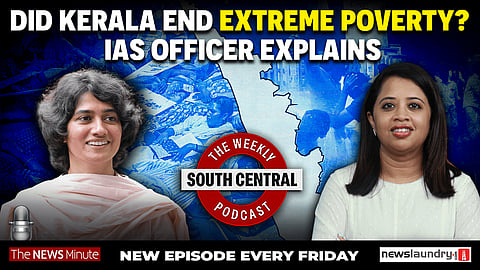How Kerala says it ended extreme poverty: An IAS officer explains on South Central 50
Kerala has announced that it has “eradicated extreme poverty,” a claim that has drawn admiration, skepticism and everything in between. On South Central, Dhanya Rajendran and Anisha Sheth spoke to IAS officer Anupama TV, Special Secretary of the Local Self Government Department, and Professor Freddy Thomas from Bengaluru’s Christ University, to understand how the state arrived at this point.
Anupama explained that the state identified extreme poverty based on “four distress factors — safe shelter, income, food and health care.” Families were assessed through a “participatory process” led by local bodies. “The initial list was scrutinised by the Gram Sabha, with enumeration and a 20% super check,” she said. The key difference, she emphasised, was that each family received a micro plan. “It was not one scheme for everyone. For each family, whichever interventions were needed — health, housing, livelihood — all were included.”
Professor Freddy noted that this approach was “bottom-up and decentralized,” rooted in Kerala’s history of grassroots democracy. He said Kerala treats welfare not as a handout but as a “safety trampoline,” enabling people to rebuild their lives rather than stay dependent. However, he added that the programme now needs “sustained monitoring and transparency,” especially amid concerns that some tribal communities may have been left out.
South Central also discussed Mamdani’s victory as New York Mayor.
Journalist Prajwal Bhat, who joined us from New York, explained that Zohran Mamdani’s victory sparked intense reactions among sections of the Indian right wing, even though opposition within New York itself was limited.
He noted that the Hindu right mobilised only late in the campaign, even flying a banner calling Mamdani “anti-Hindu,” but there were hardly any local protests. In fact, Prajwal pointed out that “Indian Americans, including Gujarati and Malayali pockets in Queens, largely voted for Mamdani,” and some even organized as “Hindus for Zohran.” He also highlighted that young voters turned out in record numbers, drawn to Mamdani’s social democratic agenda on rent, childcare and public transport.
Listen & follow on Apple
Listen & follow on Spotify
Listen & follow on YouTube
Once a month, we will invite one TNM subscriber to the show. Write to us on what you would like to speak about to southcentral@thenewsminute.com
Send your thoughts, suggestions, and criticism as well.
You can also let us know what you think by filling out our quick feedback form. Your suggestions help shape future episodes of South Central.
Audio Timecodes
00:00:00- Introduction
00:01:44 - Ayodhya of the south
00:04:03 - Headlines
00:14:02 - Kerala eradicates extreme poverty
00:49:26 - Mamdani wins
01:09:51 - Yogendra Yadav on SIR
01:25:02- Recommendations
References
Ayodhya of the South – A timeline of ‘time immemorial’
Ayodhya of the south: The Sangh’s southern rehearsal
RSS has a long-term plan in Kerala — it’s building local economic communities
How Zohran Mamdani has taken the Kejriwal Model to New York
An Emboldened Mamdani Sheds Conciliatory Tone
Recommendations
Freddy Thomas
Accelerating India's Development
Prajwal Bhat
Anisha Sheth
Dhanya Rajedran
Contribute to our reporting fund. Click here.
To check out our other shows, Click here
To not miss any updates, join TNM's WhatsApp Channel! Click here
Produced by Bhuvan Malik, edited by Jaseem Ali.

